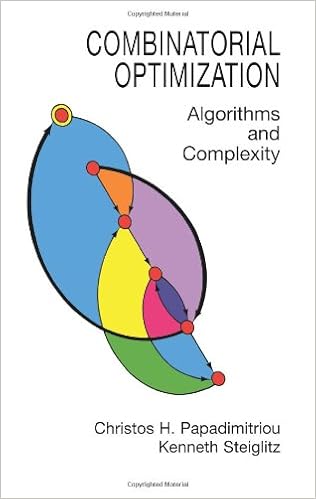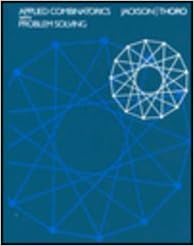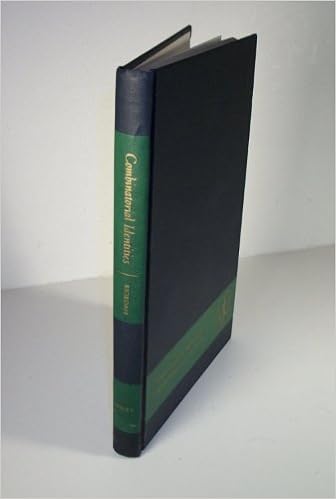
By Christos H. Papadimitriou
Read or Download Combinatorial Optimization: Algorithms and Complexity (Dover Books on Computer Science) PDF
Best Combinatorics books
Finite Projective Spaces of Three Dimensions (Oxford Mathematical Monographs)
This self-contained and hugely special examine considers projective areas of 3 dimensions over a finite box. it's the moment and middle quantity of a three-volume treatise on finite projective areas, the 1st quantity being Projective Geometrics Over Finite Fields (OUP, 1979). the current paintings restricts itself to 3 dimensions, and considers either issues that are analogous of geometry over the advanced numbers and themes that come up out of the trendy concept of prevalence buildings.
Applied Combinatorics With Problem Solving
Publication by means of Jackson, Bradley, Thoro, Dmitri
Mathematics as Problem Solving
A number of user-friendly concepts for fixing difficulties in algebra, geometry, and combinatorics are explored during this moment variation of arithmetic as challenge fixing. each one new bankruptcy builds at the past one, permitting the reader to discover new equipment for utilizing common sense to resolve problems. Topics are presented in self-contained chapters, with classical ideas in addition to Soifer's personal discoveries.
Combinatorial Identities (Wiley Series in Probability and Mathematical Statistics)
COMBINATORIAL IDENTITIES explores the opportunity of discovering parts of order and coherence in combinatorial identitiesâ€"identities among, or when it comes to, combinatorial entitiesâ€"within mathematical settings. simply because this can be a evidently chaotic topic, a number of divergent yet similar issues look within the dialogue.
Extra info for Combinatorial Optimization: Algorithms and Complexity (Dover Books on Computer Science)
An set of rules for specific Representatives,” American Math. per 30 days, sixty three (1956), 716-17. [FF]FORD, L. R. , and D. R. FULKERSON, Flows in Networks. Princeton, N. J. : Princeton Univ. Press, 1962. Theorem 10. 1 (the augmenting direction theorem) used to be proved independently via either [Be]BERGE, C. , “Two Theorems in Graph Theory,” Proc. nationwide Acad, of technology, forty three (1957), 842-44. [NR]NORMAN, R. Z. , and M. O. RABIN, “An set of rules for a minimal disguise of a Graph,” Proc. American Math. Society, 10 (1959), 315-19. it's fascinating that for the longest time it was once believed that this theorem instantly indicates an effective set of rules for nonbipartite matching. The intricacy of the matter and its based answer have been first mentioned by means of Jack Edmonds. [Ed]EDMONDS, J. , “Paths, bushes and Flowers,” Canad. J. Math, 17 (1965), 449-67. For the bipartite case, the O(| V |1/2 | E |) set of rules of Sec. 10-3 is because of [HK]HOPCROFT, J. E. , and R. M. KARP, “A n5/2 set of rules for optimum Matching in Bipartite Graphs,” J. SIAM Comp. , 2 (1973), 225-31. the truth that this set of rules is a different case of the max-flow set of rules utilized to an easy community was once first mentioned through [ET]EVEN, S. , and R. E. TARJAN, “Network move and trying out Graph Connectivity,” J. SIAM Comp. , four, no. four (1975), 507-12. The quickest set of rules identified for nonbipartite matching is defined in [MV]MICALI, S. , and V. V. VAZIRANI, “An set of rules for locating greatest Matching usually Graphs,” Proc. Twenty-first Annual Symposium at the Foundations of computing device technological know-how, lengthy seashore, California: IEEE (1980), 17-27. An prior set of rules, much less effective for sparse graphs, is defined in [EK]EVEN, S. , and O. KARIV, “An O(n2. five) set of rules for max Matching normally Graphs,” Proc. 16th Annual Symp. on Foundations of machine technological know-how, Berkeley, California: IEEE (1975), 100-12. [Ka]KARIV, O. , An O(n2. five) set of rules for max Matching typically Graphs, (unpublished Ph. D. Thesis, Technion, Haifa, Israel, 1977). challenge three is from [NR]. challenge four is from [Tu]TUTTE, W. T. , “The components of Graphs,” Canad. J. Math. , four (1952), 314-28. challenge five is from [FKN]FUJII, M. , T. KASAMI, and okay. NINAMIYA, “Optimal Sequencing of 2 identical Processors,” J. SIAM, 17 (1969), 784-89, and challenge 15 from [PY]PAPADIMITRIOU, C. H. , and M. YANNAKAKIS, “The Complexity of constrained Spanning Tree Problems,” pp. 460-70 in Automata, Languages, and Programming, ed. H. A. Maurer. Berlin: Springer-Verlag, 1979. †If S, T are units, then S ⊕ T denotes the symmetric distinction of S and T, outlined as †In our notation for paths, we use expressions akin to [u, p, w, p′, v], the place u, w, and v are nodes, to indicate (in the above instance) a direction p with endpoints u and w, by way of a direction p′ with endpoints w and v. additionally, [p, q] is the concatenation of 2 paths, without end-points targeted. If p is a direction, pR denotes its opposite. eleven Weighted Matching eleven. 1 creation a way more concerned model of the matching challenge is the single during which we're given, along with the graph G = (V, E), a bunch wij ≥ zero for every part , known as the burden of[vi, vj].



